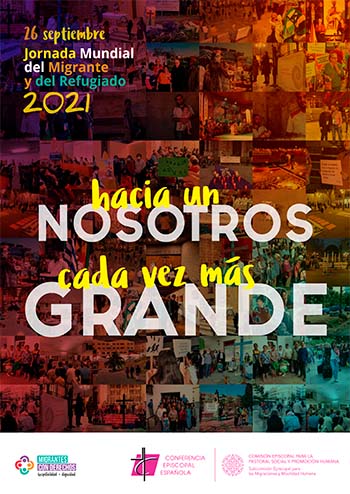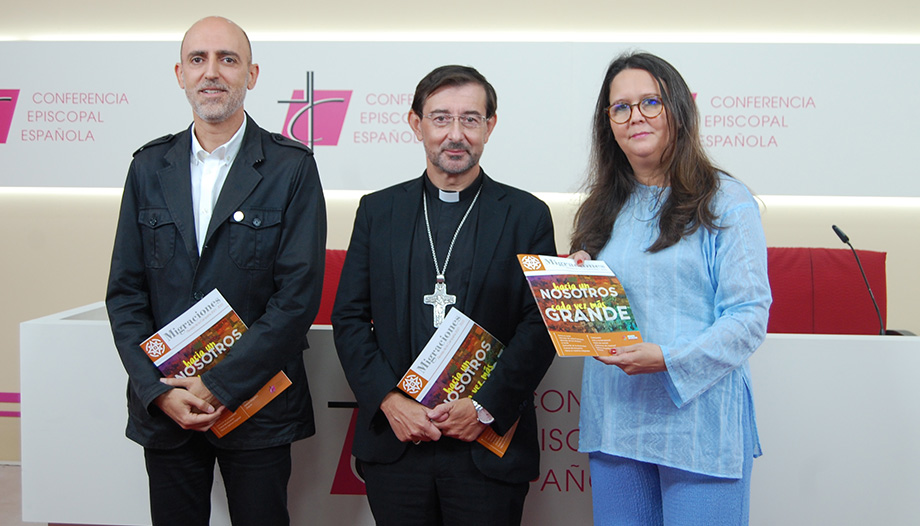To go beyond the barrier of the "them" barrier and dare to pronounce a new "we" that embraces every human being, in order to "seek the dignity that unites us and thus build fraternity". In the presentation of the Day, which has as its slogan "Towards an ever greater us", José Cobo, auxiliary bishop of Madrid and bishop in charge of Migration; the director of the Department of Migration, the Dominican Xabier Gómez, the director of the Department of Migration, Msgr.; and the Venezuelan Milagros Tobías, from the parish of Nuestra Señora del Camino (Madrid), mother of three children, one of them physically handicapped, whom she called in her testimony "the angel that came into my life.
Monsignor José Cobo began by recalling the message of the Spanish bishops before this World Day, in which "the Pope places us once again before the horizon of fraternity and makes us a new invitation in which he places before us the definitive vaccine that the human family needs: to go out of a small 'we', reduced by borders or by political or economic interests, to go to a 'we' included in God's dream, in which we live as brothers sharing the same dignity that he gives us".
"It is an internal movement," he added, "that asks us to overcome the barrier of 'them' in order to dare to pronounce a new 'we' that embraces every human being. It is easy to understand for those of us who pronounce the Our Father as the coming prayer of Christ that places us in the disposition to live as children".
The bishop in charge of Migration pointed out that "we are all interrelated, we all depend on each other, and he stressed that "we are not starting from zero. Many people are working so that society welcomes the phenomenon of migration with new eyes".
Vulnerable people continue to call

"We have had a complicated year," the message continues. "With the pandemic, we do not forget the dramatic migration crises, both at the borders of the Canary Islands and in Ceuta and Melilla. Vulnerable people on the move continue to call out to our borders. With them we feel that we are together in a world plagued by catastrophes, wars and consequences of climate change that continue to force many to leave their land. Nor do we cease to worry and pray for the pain of those who, soon after arriving, try to make their way in our society, which, in a short time, has substantially increased its inequality".
Cobo reiterated the idea of interconnectedness, of what we share. "In this time we have also learned to realize that we are all interconnected, that we share destiny and journey. We know that we are in the same boat in the midst of many storms, where we either stay together or perish together."
But along with the storms, "the Holy Spirit never ceases to offer us a broad and hopeful outlook so that we can weave a future where each time the 'we' that we pronounce, small, limited and revolving around our interests, is transformed into a fraternal and evangelical 'we', which binds us together and gives us a horizon to which to direct ourselves from our different vocations".
The Church reaches out to the State
"We cannot conjugate a them and us, we have to look for the dignity that unites us, and thus build fraternity. There are no first or second category people, there are human persons. This Day asks us to make three efforts", reiterated Monsignor Cobo:
1) to take a fresh look at migration.
2) to look at and thank the Christian communities for the efforts they make to "welcome together" those who arrive.
And 3) look at the whole of society, and "contemplate migration as a lifeline for the future. The Church wants to work with the State, with society. We are experts in humanity, and we generate spaces of welcome and spaces of encounter".
The bishops of the Subcommission on Migration, which is part of the Episcopal Commission for Social Pastoral Care and Human DevelopmentIn order to respond in the key of 'we', they explain that "we are called to make every effort to constitute, with everyone, a system that normalizes legal and safe migration in the long term, and that is fully based on an ethic based on human rights, on the horizon of universal fraternity and on international law".
"This opens us up," they say, "to the task of helping to recreate a model of citizenship that fosters a culture of integration and learns to globalize the responsibility of living together in this common home. And they point out as an example the proposals of the Pope Francis in the chapter dedicated to "the best policy" in the encyclical Fratelli tutti.
The message of the bishops highlights "the importance of the Global Compact for Migration and the initiative of international policies that guarantee these rights from the inclusive and broad 'we' that looks at fraternity as a 'new frontier'. Christians are part of the 'we', they point out.
They also add that "we cannot leave the decision-makers alone, neither the rulers nor those who manage the crisis. It is time to incorporate the cry of so many and to welcome the footprints already marked. For this reason, we are grateful for all the work undertaken during this time by those who act as bridges of hope for so many in their communities".
Globalization of solidarity
Dominican Xabier Gomez, director of the Migration department, recalled the Pope's words in Lampedusa in 2013, when he pointed out that it was about moving from the globalization of indifference to the globalization of solidarity, and also stressed that this is the 107 World Day, That is to say, this is not a message of Pope Francis himself, but that there have been more than one hundred days, which began in 1914. "We have to rethink together a more inclusive model that does not generate discarding," he said, "and seek comprehensive, coordinated solutions". "The Church in Spain is not asleep", he stressed, it is about "the cause of dignified life", of forging "a more just, fraternal and hospitable society".











